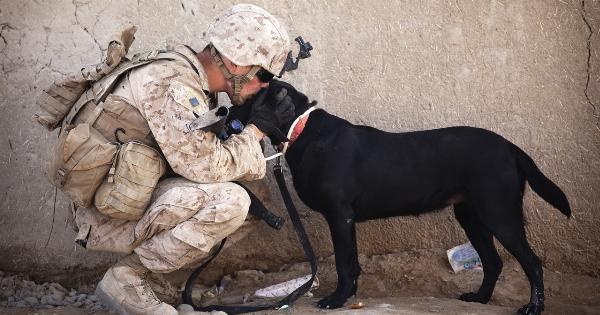Obesity is a growing concern not only for humans but for our furry companions as well. While we often associate obesity with humans, it’s crucial to recognize that dogs can also suffer the consequences of carrying excess weight.
A pudgy pup may seem cute and adorable, but the reality is that obesity can significantly impact a dog’s overall health and lifespan. In this article, we delve into the various ways in which obesity affects our beloved canine friends and explore steps to help prevent and manage this condition.
The Risks of Canine Obesity
Obesity in dogs can lead to various health problems and negatively impact their quality of life. Here are some significant risks associated with canine obesity:.
1. Reduced Lifespan
One of the most substantial concerns of obesity in dogs is its potential to shorten their lifespan. Several studies have highlighted a clear correlation between obesity and a decreased life expectancy in canines.
The excess weight puts a strain on the dog’s joints, heart, and other vital organs, leading to a higher likelihood of developing serious health issues that can ultimately prove fatal.
2. Joint Problems
Obesity can significantly increase the risk of joint problems in dogs, particularly arthritis. The additional weight puts excessive pressure on the joints, causing pain, stiffness, and reduced mobility.
Over time, this can lead to debilitating conditions that require extensive treatment and management.
3. Heart Disease
Similar to humans, obesity in dogs is associated with an increased risk of heart disease. The heart has to work harder to pump blood throughout the body, leading to strain on the cardiovascular system.
This strain can eventually result in heart failure, a condition that significantly reduces the dog’s lifespan and overall quality of life.
4. Diabetes
Obesity is a leading risk factor for diabetes in both humans and dogs. When a dog is overweight, their body’s ability to regulate blood sugar levels becomes compromised.
This can lead to the onset of diabetes, a chronic illness that requires lifelong management and can lead to a multitude of complications if left uncontrolled.
5. Respiratory Issues
Dogs carrying excess weight can also experience difficulties with breathing and respiratory functions. The added fat around the chest area can compress the lungs, making it harder for the dog to breathe.
This compromised respiratory system can lead to exercise intolerance, reduced energy levels, and an overall decline in the dog’s well-being.
Preventing Canine Obesity
The good news is that canine obesity is a preventable condition. Here are some effective measures to help keep your dog fit and at a healthy weight:.
1. Proper Diet
Feeding your dog a nutritious and balanced diet is paramount in maintaining their optimal weight. Consult with your veterinarian to determine the appropriate portion sizes and the best dietary options for your dog’s specific needs.
Avoid excessive treats and human food scraps, as these can quickly contribute to weight gain.
2. Regular Exercise
Ensuring that your dog gets enough exercise is vital for their overall well-being. Regular walks, playtime, and engaging activities can help burn excess calories and keep your dog physically active.
The type and duration of exercise will depend on your dog’s breed, age, and any underlying health conditions, so always consult your vet for specific recommendations.
3. Avoid Overfeeding
Many dog owners have a tendency to overfeed their pets, inadvertently contributing to obesity. Follow the feeding guidelines provided by your veterinarian and resist the temptation to overindulge your furry friend.
Monitor your dog’s weight regularly and adjust their diet accordingly to maintain a healthy body condition.
4. Regular Vet Check-ups
Regular check-ups with your veterinarian are essential for early detection of any health issues, including obesity. Your vet can provide guidance on weight management, suggest suitable dietary changes, and monitor your dog’s progress over time.
5. Mental Stimulation
Mental stimulation is just as important as physical exercise for your dog’s well-being. Boredom and stress can lead to overeating and weight gain.
Provide your dog with interactive toys, obedience training, and engage in activities that keep their mind stimulated.
Managing Obesity in Dogs
If your dog is already overweight or obese, it’s never too late to help them shed those extra pounds. Here are some tips to manage obesity in dogs:.
1. Consult with Your Veterinarian
Before starting any weight loss program, consult your veterinarian. They will assess your dog’s overall health, determine a target weight, and create a customized plan that incorporates appropriate diet and exercise.
2. Gradual Weight Loss
Rapid weight loss is unhealthy for dogs and can lead to further complications. Aim for a gradual weight loss of around 1-2% per week. This slow and steady approach ensures a healthy transition and minimizes the risk of any adverse effects.
3. Portion Control
Measure your dog’s food carefully to control portion sizes. Avoid free-feeding and establish a consistent feeding schedule.
Dividing their daily food allowance into multiple smaller meals throughout the day can help keep them satiated and prevent overeating.
4. Exercise Regimen
Work with your veterinarian to create an exercise regimen tailored specifically to your dog’s needs. Gradually increase the duration and intensity of exercise to support weight loss without putting excessive strain on their body.
5. Monitor Progress
Regularly track your dog’s weight and body condition. Adjust their diet and exercise routine as necessary to ensure they are steadily progressing toward their target weight.
Stay in close communication with your veterinarian and seek their guidance throughout the weight loss journey.
Conclusion
Obesity is a serious condition that can significantly impact a dog’s lifespan and overall quality of life.
By understanding the risks associated with canine obesity and taking preventative measures, we can ensure our furry companions lead healthy and fulfilling lives. By providing a balanced diet, regular exercise, and appropriate veterinary care, we can help our dogs maintain an ideal weight and ward off the many complications associated with obesity. Remember, a healthy dog is a happy dog!.





























